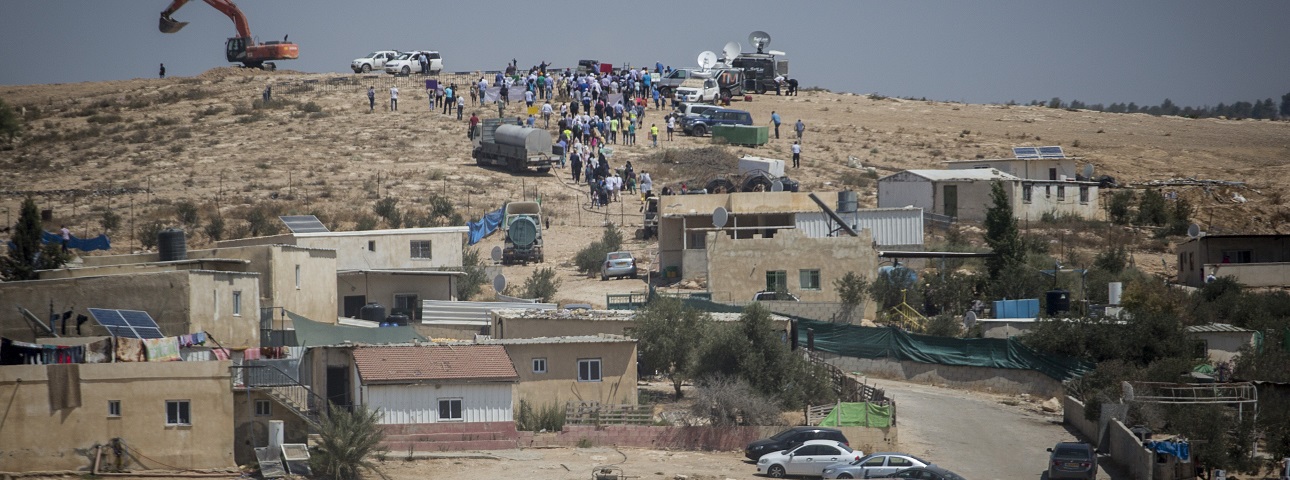Democracy for All
Democracy is not just majority rule, but ensuring that all segments of society are provided with the opportunity to take part in a free and fair political process. For Israel, this means ensuring that the Bedouin population has equal opportunity to place their vote in the upcoming election.

Flash 90
Although the majority of people think that the word democracy means “majority rule”, in fact the ancient Greek word means demos – the weakest section of the people, and kratia – power, demonstrating an alternative meaning for democracy. Not only is democracy the rule of the people or the rule of the majority, it is also a form of government that is supposed to confer power to those who have only minimal resources. Therefore, the ultimate test of a democracy is how much power it gives to disadvantaged sectors of the population, including whether it grants them access to government institutions, to decision makers and of course, the right to vote and to be elected. As a form of government, democracy is expected to remove actual, institutional and perceived barriers, to make the political process more accessible, and thus bolster the foundations for citizens’ participation in the political process.
However, in today's Israel, a significant percentage of disadvantaged citizens still encounter difficulties. If we are being kind to the State, we would say that the authorities are not doing anything to break down the barriers and enable these disadvantaged sectors of the population to exercise their basic right to vote in Knesset elections. The most striking example is in the Negev region of southern Israel. Just last week, the Central Elections Committee came up with a variety of reasons for not installing polling stations in the unrecognized Bedouin villages, including by saying that there is no accurate data on the addresses of the residents of these villages. Noticeably, this has an obvious negative impact on tens of thousands of eligible Bedouin voters in the Negev who will be unable to exercise their right to elect their representatives, and who could promote policies that respond to the dire needs of the residents of unrecognized villages. In other words, the Bedouin population in general, and those living in unrecognized villages in particular, not only face a multitude of economic, social and educational challenges, making their situation far more severe than that of the general Arab population, they also do not have the formal means to try and alter their situation. We can see how in this situation the demos does not even have a minimal amount of kratia.
While there are indeed objective difficulties in enabling voting for the thousands of Bedouin who live in the unrecognized villages, since they lack an official address, making it difficult to locate them and check their identity when they come to vote. However, a country that truly wishes to be a democracy must act to change the situation, rather than perpetuate it. It is also important to note that polling stations are set up wherever there is a Jewish community, no matter how small it is; Only in the unrecognized villages are there no polling stations, which indicates a very real possibility that the difficulty is not simply a technical one. The fact that no practical solutions have been proposed to deal with the unique case of the unrecognized villages, deals a blow to their right to representation and their critical problems are not placed on the public agenda and are not a priority for the authorities. In fact, by failing to take responsibility and proposing solutions that could resolve this issue, the State is ignoring an entire segment of its citizens and declaring that they are considered second-class. Faced with difficulties in going to a polling station, and knowing that either the State is incapable of finding a solution to their situation or wanting to perpetuate it, Bedouin citizens have little motivation to participate in Israeli life and have no faith in their ability to influence their own lives.
Elections are not only a way of exercising one’s right to elect and be elected; they are also an opportunity to allow marginal groups to find expression and to exercise their influence. Breaking down barriers forges a stronger link between politics and day-to-day life and brings it down to earth.
One of the main government and public failings in the past decades has been the question of installing polling stations in the unrecognized villages in the Negev: the non-recognition of these villages, the lack of investment in them and the unwillingness or the inability to deal with their planning, economic, educational and infrastructure needs and problems Anyone who cares about democracy in Israel and fears for its future must fight to remove the institutional and perceived barriers faced by the Bedouins living in the unrecognized villages.
This campaign should not be waged by Bedouin society alone. Anyone who is committed to ensuring that Israel be a democratic nation must not stand aside.
The article was published in the Jerusalem Post.
